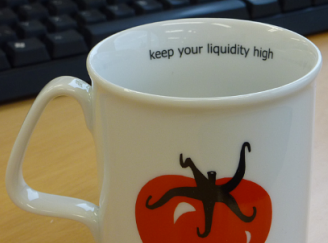TOMATO CATCH-UP - Newsletter Issue 206 – December 2017
Your monthly resource on working capital, process optimization and issues relating to the world of corporate treasurers, IT professionals and bankers!
This newsletter is bilingual, English or German according to the source.
Introduction:
It’s hard to believe but 2017 is nearing its end! It has been a privilege to present you Tomato Catch-up throughout the year. We’d like to take this opportunity to thank you for being a loyal reader and for any feedback you may have given us.
After a year of working hard, congratulate yourself and your team members on jobs well done and on the relationships that helped make it happen. Then slow down and enjoy the rest of the year!
All of us at Tomato wish you and your families an unforgettable Christmas and happiness and success throughout the coming year.
Enjoy the topics in today’s newsletter.
Regula Spottl and the Tomato Team
Topics
- Review of 2017 by Martin Schneider
- Structured Finance Congress, 8.-9. Nov. 2017: Follow-Up
- Vastly Lower Corporate Tax Rate in Vaud
- Compliance Risiken vermeiden mit KPMG’s Tools
- A Survival Strategy is Key for the Digital Transformation
- Effects of the US Tax Reform on Swiss Companies
- Stop Using Excel, CFOs Tell Their Staff
- Ways Newer ERP Systems Overcome Limitations
- How to Lower the Risk of Fraud in Business?
- Mental Accounting: Concept by Richard Thaler, Nobel Prize Winner 2017
- Changes in Central Banks’ Politics/Finanzmärkte im Zustand trügerischer Behaglichkeit?
Review of 2017 by Martin Schneider
2017 was a year to celebrate for us at Tomato. 25 years ago, after one-year treasury consulting, we crafted on my kitchen table at home Tomato’s corporate mission as “Keep Corporates’ Liquidity High”. Today, this mission is as relevant as it was then.
On May 5, 1992, I started to operate with my Compaq laptop, which cost CHF 10.000 at the time, and my brown leather ‘doctor suitcase’, which I still use for visits to clients. I bought this “suitcase” because it was the only one that would fit my Compaq.

The same day 25 years later, we opened our doors to clients, partners and friends to celebrate our anniversary with coffee and croissants.
This year, I attended multiple events to be current on corporate finance developments and to make new contacts and maintain old ones.
The highlights in 2017 include our Brown-bag-lunches in seven cities in Switzerland and Liechtenstein with the main topics FinFrag/EMIR, negative interest rates, payment security, payment services in restricted countries and SAP for Single Finance/Hana.
I also attended the 1TC in Southern Germany in March, the Swiss Treasury Summit in Zug in September, the Alpbacher Finanzsymposium in Tyrol in October and Structured Finance in Stuttgart in November.
My sincerest thanks to our loyal clients and suppliers and my team throughout the years! Remember: Keep Your Liquidity High!

Structured Finance Congress, 8.-9. Nov. 2017: Follow-Up
Die Tomato AG war auch in diesem Jahr auf der Structured Finance Messe in Stuttgart – für Sie wieder mit den beliebten Tomato-Tassen. Der Tassenaufdruck „Keep Your Liquidity High“ gefällt den Besuchern und ist als Ermahnung auf dem Bürotisch äusserst gefällig.
Wollten Sie vor Tagungsende noch eine Tasse, doch es war keine vorrätig? Schreiben Sie uns eine kurze Mail und die Tasse steht in wenigen Tagen auf Ihrem Tisch!
Vastly Lower Corporate Tax Rate in Vaud
The Vaud Council of State has confirmed a substantially lower corporate tax of 13.79% in the canton as of January 1, 2019 regardless of the corporate tax reform under way at the federal level.
KPMG is closely monitoring developments and will advise corporates about how they will be affected. Details of KPMG’s blog Vaud confirms massively lower corporate tax rates
Compliance Risiken vermeiden mit KPMG’s Tools
Die Regeln für Geschäftsreisen ins Ausland werden immer strenger und deren Einhaltung ist immer strikter kontrolliert. Für international tätige Unternehmen ist es wichtig, diese Regeln zu kennen, um kostspielige und gefährliche Probleme zu vermeiden.
KPMG hat dazu mehrere elektronische Tools entwickelt, die auch mittels App abrufbar sind. Zum Beispiel: Ein Mobile Workforce Self-Assessment, der Enterprise Assignment Manager und den webbasierten Global Equity Tracker (GET). Details…
A Survival Strategy is Key for the Digital Transformation
Werner Vogels, VP & CTO at amazon.com, explained in January 2017 in the article A survival strategy for the digital transformation what such a strategy entails.
Most importantly, companies need to adapt their offerings fast to changing customer behavior. Instead of delivering to their customers' changing needs, they need to anticipate them. And in order to position themselves as a winner, they have to understand why and how start-ups, niche providers and medium-sized players are able to capture global markets.
The article shows good examples of German companies that already do this.
Der Artikel erschien letzte Woche in der Wirtschaftswoche unter Überlebensstrategie für die digitale Transformation. In dieser Kolumne erklärt Werner Vogels Strategien in der digitalen Realität :
- das eigene Geschäft durch die Augen des Kunden zu betrachten und
- zu verstehen, dass hohes Innovationstempo der Schlüssel zu nachhaltigem Wachstum ist.
Effects of the U.S. Tax Reform on Swiss Companies
The proposed tax reform in the United States represents the biggest step in 30 years. Developments represent just the first step on the road to the potential reform. A key element is the reduction of the U.S. federal corporate tax rate from 35% to 20%.
In the blog US Tax Reform: Surprising news for Swiss groups, KPMG’s Sebastien Maury explains how the relevant measures would affect Swiss parented groups with operations in the US, measures of relevance to U.S. parented multinational groups with operations in Switzerland, and what it could it mean for Swiss groups having a U.S. presence.
Das könnte Sie ebenfalls interessieren:
NZZ: Wieso sich die USA mit Steuerreformen schwertun - zur USA - Steuerreform mit Vergleichen zur EU.
Stop Using Excel, CFOs Tell Their Staff
The article Stop Using Excel, Finance Chiefs Tell Staffs, published in the Wall St. Journal, advocates to stop using Excel because it’s outdated. The article lists various companies that are cutting the use of Excel for financial planning, analysis and reporting. It also introduces alternative ways to do the tasks excel is not suited for.
The article has gotten over 420 comments.This comment echoes many others: It suggests that the article “gives the impression that Excel is somehow flawed and shouldn't be used for serious financial tasks. Like any tool, you have to know what it does best, and what it's not suited for. Excel was never designed to be used as an enterprise-level database tool.”
We at Tomato don’t disagree with this comment. However, again and again, we point to the presentation in 4 steps from Excel to TMS (in German).
Ways Newer ERP Systems Overcome Limitations
New breeds of ERPs offer features that overcome limitations of ERPs that a slightly out of date. In the CIO.com article 5 Ways Newer ERP Systems Overcome Limitations, Bart Perkins, a contributing columnist to CIO, explains what you need to know about new ERPs and how to simplify the process when you decide that your ERP system needs an update. Details…
How to Lower the Risk of Fraud in Business?
In a TED talk presented at TEDxZurich, Alexander Wagner, an economist who teaches at University of Zurich, introduced the importance of this topic. It’s a serious issue since 1 in 7 companies commits fraud, he said. In his presentation, he first presented the classic theories of motivation by Adam Smith and Immanuel Kant.
He then deduced that there are two very, very different visions.
- You can appeal to benefits and costs (you do the right thing and you’ll be rewarded, or you don’t and you’ll pay) and try to get people to behave according to them.
- Or “you can select people who have the values and the desirable characteristics and of course -- competencies that go in line with your organization.”
Dr. Wagner and his colleagues conducted research on these two visions and concluded that it’s okay to appeal to incentives; they actually work. But it’s smarter to select the right people with the right values. “It will pay off to put people first”, Dr. Wagner suggests.
This TED talk is powerful. (11:43 min)
Mental Accounting: Concept by Richard Thaler, Nobel Prize Winner 2017
Richard Thaler won the Nobel Memorial Prize in Economic Sciences 2017 for his contributions to behavioral economics. In an interview in the NYTimes, Mr. Thaler talks about “Silly (but Serious) Things”. Well, Mr. Thaler used observations in everyday life to form behavioral economic concepts. The interview is interesting and entertaining!
Mr. Thaler is best known for his concept of “mental accounting.” To the question “how would you explain it?” he answers “The best explanation, actually, is in a YouTube video (1:02 mins) with Gene Hackman and Dustin Hoffman.”
Changes in Central Banks’ Politics / Finanzmärkte im Zustand trügerischer Behaglichkeit?
By Martin Schneider
Central Bank chairmen sometimes report a trend with a specific vocabulary that the public fails to take to heart or hardly notices.
For example, during the dot-com bubble of the 1990s, Alan Greenspan used the phrase ‘irrational exuberance’ as a warning that the market was overvalued. Yale Professor Robert Shiller used ‘irrational exuberance’ as title of his book in 2000.
On November 29, at a public talk at the University of Zurich, Fritz Zurbrügg, Vice Chairman of the Governing Board, Swiss National Bank,pointed out that the “complacency index” was never as high as today. The Wall St. Journal defined the term “complacency index” as a measure of confidence that stock prices will continue to rise.
Zwei passende NZZ Berichte: Andreas Uhlig in der NZZ vom 10.7.2017. ‚Die Märkte werden selbstgefällig‘ und in der NZZ vom 3.12.2017 Gefahr einer Baisse durch die sinkende Liquiditätszufuhr der Notenbanken.
From the Desk of Regula Spottl, Greensboro, NC, USA
I have talked about MOOC classes before. In 2015 I wrote: I’m a huge fan of MOOC classes, have taken several over the last few years. MOOCs are free classes universities all over the world offer. They are well-known in Switzerland as well.
The University of Zurich also offers MOOCs and Free Online Courses.
One of the classes that may interest you: «Das liebe Geld – Finance im Alltag». Diese Klasse gibt eine intuitive und praktische Einführung in persönliche Finanzthemen und einen Einblick in aktuelle Forschungsgebiete der Finance.
If you don’t want to earn a certificate, you can start the class any time. It takes 2-3 hours a week for 6 weeks. Click on “full course, no certificate”!
